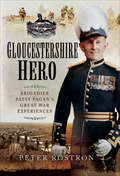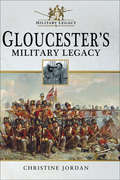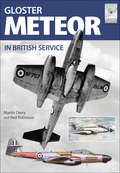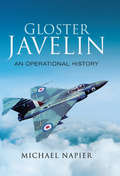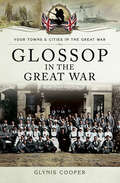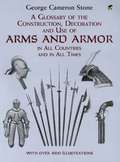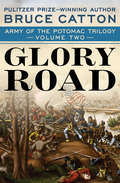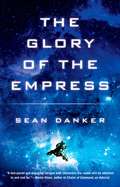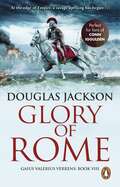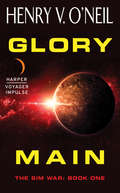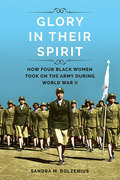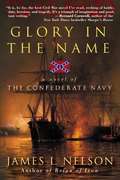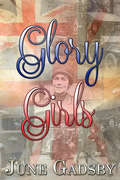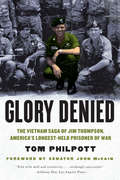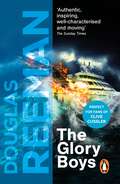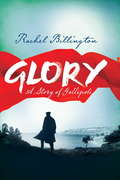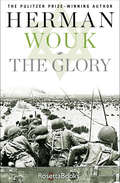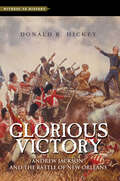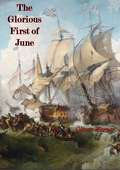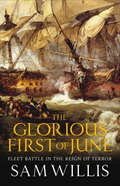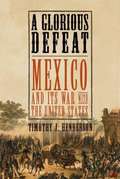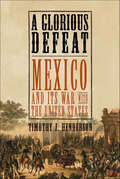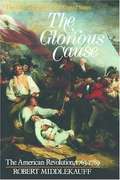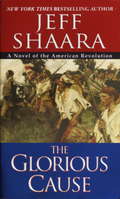- Table View
- List View
Gloucestershire Hero: Brigadier Patsy Pagan's Great War Experiences
by Peter RostronSmall in physical stature Colonel, later Brigadier, Patsy Pagan was seen as a giant by the men of the Gloucestershire Regiment, whom he commanded for over three gruelling years of The Great War.He and his Battalion endured some of the hardest fighting and grimmest conditions on the Western Front; The battles of Loos 1915, Somme 1916 and Passchendaele 1917. Wounded three times, Pagan discharged himself from hospital to rejoin his men rather than be evacuated to Blighty.He reluctantly left his beloved Glosters when promoted to command a brigade for the closing months of the war. His brigade found itself as the last line of defence before the Channel against the Germans' 1918 offensive.The author uncovers the contribution and character of this great fighting soldier through personal records, trench diaries and other official papers. This is a stirring and inspiring read.
Gloucester's Military Legacy (Military Legacy)
by Christine JordanFrom the establishment of Gloucester as a Roman colonia, a colony of retired military veterans, the city has held a strategic position, being close to the easiest crossing over the River Severn and into Wales. The Romans began building the city's defences, including the city walls and bastions, which were further enhanced by the great warrior Aethelflaed and which would become invaluable in the Siege of Gloucester during the Civil War in 1643. These walls would be destroyed by Charles II as a punishment for the city's role in the conflict. In the twelfth century, Gloucester's first motte and bailey castle were built and used by a number of kings as a garrison to prepare attacks against the Welsh and the Irish. The formation of what would become known as 'The Glorious Glosters', in 1782, led to a number of notable military campaigns, including the battles of Alexandria, Quatre Bras, the Second Boer War, including the Siege of Ladysmith, both World Wars and the Korean War. Christine's book will take you on an historic journey, uncovering on the way the city's military legacy.
The Gloster Meteor in British Service
by Neil Robinson Martin DerryThe Gloster F.9/40 was Britain’s first jet fighter and as the Meteor F.I became the first jet-powered aircraft of any description to enter service with the Allies in World War II. Several early Meteors were dispatched to Europe in the hope that 1945 might witness the first ever jet-on-jet combats between it and the much-vaunted German jets – a contest which, in the event, was never to occur. Postwar, and the Meteor quickly became the backbone of the UK’s day fighter defenses, progressing through successive Marks as it did so, until finally being replaced on the front line by later types during the mid-1950s. With their ever-adaptable airframe, two-seat Meteors became Britain’s primary night fighter too, serving for several years until replaced by the Gloster Javelin from the late 1950s onwards. With its operational career over, the Meteor’s adaptability and ruggedness was put to sterling use as an advanced trainer, the most obvious example of which was the T.7\. As late as 1982, a handful of stalwarts were still soldiering on. Although space precludes a comprehensive history of such a prolific aircraft, it is hoped that both aviation enthusiasts and aircraft modelers may find some interesting examples in these pages, and sufficient inspiration to help them choose which color scheme to finish their latest Meteor model in. This latest addition to the FlightCraft range follows our well-established format in that it is split into three primary sections. The first covers the Meteor using numerous photographs, informative captions and tables. The second is a 16-page full-color illustration section featuring detailed profiles and 2-views of many of the color schemes and markings carried by British Meteors. The final section lists as many injection-moulded plastic model kits of the Meteor, in all the major scales, that the authors could obtain, plus a gallery of models made by some of the UK’s best modelers.
Gloster Javelin: An Operation History
by Michael NapierThe RAFs only delta-winged fighter the Gloster Javelin was also Britains first true All-Weather Fighter. Based in the UK and in Germany, the RAFs Javelin squadrons formed the front line of Britains air defences in the late 1950s and early 1960s. During this time Javelin crews pioneered the operational use of guided missiles and air-to-air refuelling by fighter aircraft. In the Far East, Javelins were involved in operations during the Indonesian Confrontation and the aircraft was also deployed to Zambia during the Rhodesian UDI Crisis. In this history, which is richly illustrated with many previously unpublished photographs, Michael Napier blends official records with personal accounts to describe the operational history of this iconic jet fighter.
Glossop in the Great War (Your Towns & Cities in the Great War)
by Glynis CooperA new book on Glossop during World War I focuses on the economic and social conditions, problems and hardships of those left at home in England played out against a background of military action on the Western Front, in Turkey, Egypt and Palestine. It chronicles the difficulties, hardships and restrictions of daily life for civilians; the morale of the town year by year as the War dragged on; the growing lists of casualties and the stoical determination of the townsfolk to contribute as much as they could towards the defeat of the Kaiser. Part mill town, part farming community, Glossop's real strength turned out to be its rural parochialism. When the call came to 'dig for victory' the townsfolk did so with enthusiasm and the women proved themselves just as capable as the men. 1914 and 1915 saw some optimism but this changed after the Battle of the Somme in 1916, which destroyed the glorification of war. 1917 was a bad depressive year but despair finally mellowed in 1918. 1919 saw the impact of the influenza epidemic, the erection of War memorials, and, to Glossop's horror, the award of a tank in recognition of the town's War efforts.
A Glossary of the Construction, Decoration and Use of Arms and Armor: in All Countries and in All Times (Dover Military History, Weapons, Armor)
by George Cameron StoneWidely considered the classic book in the field, George Cameron Stone's A Glossary of the Construction, Decoration and Use of Arms and Armor in All Countries and in All Times is an indispensable resource and reference tool for anyone interested in arms and armor. Originally published in 1934, it remains an essential guide to the field. To describe the worldwide range and variety of weaponry, Stone drew upon the more than 4,000 items in his private collection of Eastern arms and armor, as well as the European arms collection of New York's Metropolitan Museum of Art, and a variety of other sources. Since the author subsequently bequeathed his entire collection to the Metropolitan Museum, this volume serves as an abbreviated visual reference to that institution's Arms and Armor collection.By profession a metallurgist, the author focused on techniques of manufacture and workmanship to derive his method of codifying the typology of weapons, relying on an alphabetized dictionary format to avoid the confusions he found in a field without standardized nomenclature. This "glossary" format makes it easy for anyone to locate material on the astonishing variety of weapons covered. These include arquebuses, blunderbusses, flintlocks, wheel locks, matchlocks, and other antique guns; German armor; French rapiers; Roman short swords; Turkish crossbows; all the Japanese bladed weapons (katana, wakizashi, naginata, etc.); the East Asian kris in its countless permutations; and many more.Illustrated with 875 detailed figures, incorporating thousands of individual photographs and drawings, the book was written from the unique viewpoint of an expert who devoted a lifetime to the field. Hard to locate today (original editions are worth hundreds of dollars), Stone's Glossary represents a peerless resource for scholars, experts, collectors, students, hobbyists, and institutions -- any student of the long history and development of weapons and armor around the world.
Glory Road: The Bloody Route From Fredericksburg To Gettysburg (Army of the Potomac Trilogy #2)
by Bruce CattonThe riveting saga of a nation at war with itself--from the Union Army's disaster at Fredericksburg to its costly triumph at Gettysburg--by Pulitzer Prize-winning Civil War chronicler Bruce Catton In the second book of the Army of the Potomac Trilogy, Bruce Catton--one of America's most honored Civil War historians--once again brings the great battles and the men who fought them to breathtaking life. As the War Between the States moved through its second bloody year, General Ambrose Burnside was selected by President Lincoln to replace the ineffectual George "Little Mac" McClellan as commander of the Union Army. But the hope that greeted Burnside's ascension was quickly dashed in December 1862 in the wake of his devastating defeat at Fredericksburg. Following Burnside's exit, a mediocre new commander, Joseph "Fighting Joe" Hooker, turned a sure victory into tragedy at Chancellorsville, continuing the Union's woes and ensuring Robert E. Lee's greatest triumph of the war. But the tide began to turn over the course of three days in July 1863, when the Union won a decisive victory on the battlefield of Gettysburg. Months later, Lincoln would give his historic address on this ground, honoring the fallen soldiers and strengthening the Union Army's resolve to fight for a united and equal nation for all of its people. With brilliant insight, color, and detail, Catton interweaves thrilling narratives of combat with remarkable portrayals of politics and life on the home front. Glory Road is a sweeping account of extraordinary bravery and shocking incompetence during what were arguably the war's darkest days.
The Glory of the Empress (Admiral #3)
by Sean DankerFrom the author of Admiral and Free Space comes an exciting military science fiction novel about an eclectic mix of Evagardian soldiers on a mission to test a new weapon, but instead find something much more dangerous.The war between Evagardian Empire and the Commonwealth is at its peak. The Evagardians have developed a weapon that could change everything, but they can't use it until it's been fully tested. Targeting unsuspecting pirates in a newly annexed system, far from the worst of the fightingsean is supposed to be a safe way to determine if the weapon is ready for live combat. Everything about the mission is unconventional; the crew of twelve has been pulled from every corner of the Imperial Service, but it should still be an easy tour. After all, a few pirates can't possibly threaten Evagard's elite, especially when they're armed with the most powerful technology in the Imperium. But it's an unproven system aboard an experimental ship, and there are worse things than pirates waiting in the Demenis System. Far from the front lines, the crew of the Lydia Bennett is about to start a war of their own, and they're a long way from home.
Glory of Rome: (Gaius Valerius Verrens 8): Roman Britain is brought to life in this action-packed historical adventure (Gaius Valerius Verrens #8)
by Douglas JacksonA riveting and all-action historical page-turner from bestselling author Douglas Jackson that will have you gripped from page one! Perfect for fans of Simon Scarrow and Ben Kane.Readers are loving Gaius Valerius Verrens! "The best Roman historical series I've yet read. Just pips Ben Kane and Conn Iggulden." - 5 STARS "I found this one hard to put down as there was action and intrigue from start to finish" - 5 STARS"Fantastic story and character creation" - 5 STARS"A simple plot but pace never lets up and keeps you wanting to "just read the next chapter before I put it down" - 5 STARS*************************************77AD. Gaius Valerius Verrens is an honoured member of Emperor Vespasian's inner circle, but the enmity between him and Vespasian's son Domitian means that, even in Rome, danger is never far away.Meanwhile, in the outer reaches of the Empire, in Britannia, trouble is brewing.The governor, Agricola is preparing to march his legions north and Valerius is Agricola's chief legal adviser and deputy governor. It's the opportunity he seeks to move his wife and son out of reach of Domitian's wrath.The massacre of a Roman garrison and suspicious death throw Agricola's preparations into confusion. Now his eyes turn west to Mona and the Druids, who still harbour hopes of ridding Britannia of Roman rule. But to deal with them, Agricola needs a soldier he can trust to lead the legion. Only one man in the province has the experience and the ability . . .So a reluctant Valerius picks up his sword once more. He soon comes to understand that any glory his new legion wins is likely to be fleeting and tainted - and that he has placed his family in deadly peril.Gaius Valerius Verrens's adventures conclude in Hammer of Rome.
Glory Main
by Henry V. O'NeilWe are closer to the Sims than we think ...For decades, mankind has been locked in a war with an alien enemy that resembles the human race so closely they are known as the Sims. Both sides battle for control of habitable planets across the galaxies--often at any cost.Lieutenant Jander Mortas is fresh out of officer training and new to the war zone but eager to prove himself. There's just one problem: disaster strikes while he's traveling to his first assignment. He wakes to find himself marooned on a planet that appears deserted, with the only other survivors: a psychoanalyst, a conscientious objector, and a bitter veteran of a brutal slave-scout detachment. As the group struggles to reach safety on a nearby base, Glory Main, they discover a Sim colony--which could mean their salvation, or their demise.Thrown together, they must fight the harsh elements, an ever-present enemy, and possibly each other.
Glory Lane
by Alan Dean FosterIt was a quiet night in Albuquerque, New Mexico.But then they mostly are.Seeth, token punk for the territory, was bored, bored, bored. Which was why he went ten pin bowling. Not for the bowling, you understand - it was Ladies' League Night - but to spread a little outrage among the upright, mostly overweight citizenry.And so it was he came upon the alien, playing lane 36, saved him from arrest by the pseudo-cops from outer space, found himself in a stolen van, along with Kerwin the nerd and Miranda the born-to-shop, Miss Teen America lookalike, driven by a green-skinned, tentacled shape changer and about to be space chased clean out of the galaxy...
Glory in Their Spirit: How Four Black Women Took On the Army during World War II (Women in American History)
by Sandra M BolzeniusBefore Rosa Parks and the March on Washington, four African American women risked their careers and freedom to defy the United States Army over segregation. Women Army Corps (WAC) privates Mary Green, Anna Morrison, Johnnie Murphy, and Alice Young enlisted to serve their country, improve their lives, and claim the privileges of citizenship long denied them. Promised a chance at training and skilled positions, they saw white WACs assigned to those better jobs and found themselves relegated to work as orderlies. In 1945, their strike alongside fifty other WACs captured the nation's attention and ignited passionate debates on racism, women in the military, and patriotism. Glory in Their Spirit presents the powerful story of their persistence and the public uproar that ensued. Newspapers chose sides. Civil rights activists coalesced to wield a new power. The military, meanwhile, found itself increasingly unable to justify its policies. In the end, Green, Morrison, Murphy, and Young chose court-martial over a return to menial duties. But their courage pushed the segregated military to the breaking point ”and helped steer one of American's most powerful institutions onto a new road toward progress and justice.
Glory in the Name: A Novel of the Confederate Navy
by James L. NelsonThen call us Rebels if you will we glory in the name, for bending under unjust laws and swearing faith to an unjust cause, we count as greater shame. -- Richmond Daily Dispatch, May 12, 1862 April 12, 1861. With one jerk of a lanyard, one shell arching into the sky, years of tension explode into civil war. And for those men who do not know in which direction their loyalty calls them, it is a time for decisions. Such a one is Lieutenant Samuel Bowater, an officer of the U.S. Navy and a native of Charleston, South Carolina. Hard-pressed to abandon the oath he swore to the United States, but unable to fight against his home state, Bowater accepts a commission in the nascent Confederate Navy, where captains who once strode the quarterdecks of the world's most powerful ships are now assuming command of paddle wheelers and towboats. Taking charge of the armed tugboat Cape Fear, and then the ironclad Yazoo River, Bowater and his men, against overwhelming odds, engage in the waterborne fight for Southern independence.
Glory Girls
by June GadsbyMary, Anne, Iris and tough little Effie form a formidable group when, in 1939, they join the FANYs, or more precisely the First Aid Nursing Yeomanry, euphemistically calling themselves 'The Glory Girls'. However, the glory they dreamed of is short-lived as their unit moves from the London blitz to occupied France. Forbidden love, betrayal and tragedy stalk them and as their personal courage is tried - and sometimes found lacking - survival seems to depend largely on luck. This is especially so for Mary. As a Special Operations Executive, and with very little training, she is sent behind enemy lines in a desperate attempt to save the lives of men in a safe house under Nazi threat. And now her only contact has been murdered by the Gestapo...
Glory Denied: The Vietnam Saga of Jim Thompson, America's Longest-Held Prisoner of War
by John Mccain Tom PhilpottNow hailed as a classic, one of the most unforgettable and heartbreaking books ever written about the Vietnam War. Glory Denied--the harrowing story of America's longest-held POW, the wrenching agonies faced by his family, and the larger story of a nation divided--returns to Norton a decade after its much-heralded publication. Excerpted in The New Yorker and later made into an opera, it is the heroic story of Floyd "Jim" Thompson, captured in March 1964, who became the longest-held prisoner of war in American history. Tom Philpott juxtaposes Thompson's capture, torture, and multiple escape attempts with the trials of his young wife, Alyce, who, feeling trapped, made choices that forever tied her fate to the war she despised. "One of the most honest books ever written about Vietnam" (Oliver Stone), Glory Denied demands that we rethink the definition of a true American hero.
The Glory Boys: a dramatic tale of naval warfare and derring-do from Douglas Reeman, the all-time bestselling master of storyteller of the sea
by Douglas ReemanAs we've come to expect from multi-million copy bestselling author Douglas Reeman, The Glory Boys expertly weaves close and detailed knowledge of the actual events of WWII into a simply brilliant and stirring action adventure, guaranteed to have you hooked from page one. Readers of Clive Cussler, Bernard Cornwell and Wilbur Smith will not be disappointed!'One of our foremost writers of naval fiction' -- Sunday Times'Mr Reeman writes with great knowledge about the sea and those who sail on it' --The Times'A real adventure' -- ***** Reader review'Great storyline - really grips you to the end' -- ***** Reader review'Typically superbly written' -- ***** Reader review'This author never lets you down' -- ***** Reader review'Great reading -- edge of your seat stuff' -- ***** Reader review********************************************************************************They're called The Glory Boys, by those who regard their exploits with envy or contempt.January 1943: Glory Boy Bob Kearton - already a veteran and survivor of the close action in the English Channel and North Sea - is ordered to the Mediterranean and beleaguered Malta, a mere sixty miles from occupied Sicily.Unexpectedly promoted to lieutenant-commander, he is given charge of a newly formed and, as yet, incomplete flotilla of motor torpedo boats.Although the tide of defeat is thought to be turning, with the enemy no longer advancing along the North African coast, Kearton's is a new war of stealth, subterfuge, and daring, in which the Glory Boys are only too expendable.
Glory
by Rachel Billington'I wonder who chose the word 'glory',' murmured Arthur. 'You mean there's nothing very glorious about war.' The Major smiled. 'People expect words like glory. I do myself.' 'Oh, I'm not against it. There were glorious deeds performed.' Glory is the story of the men and women of Gallipoli and the tragic events of 1915. Of the lives lost, the hearts broken, the decisions cast, the errors made and of the dark reality of the heroic dream. It is the story of three people, changed forever, as the echoes of war ring loud through the years.
The Glory: A Novel
by Herman WoukNew York Times Bestseller: A &“sprawling, action-packed novel&” of Israel by the author of The Hope (Philadelphia Inquirer). This follow-up to The Hope plunges immediately into the violence and upheaval of the Six-Day War of 1967—and continues the stories of its multiple characters and of Israel&’s dramatic struggle for survival across the years. The Glory takes readers through the terrors of the Yom Kippur War, the famous Entebbe rescue, and the airstrikes on Saddam Hussein&’s nuclear reactor—ending with the final hope for peace. Illuminating the inner lives of real Israeli leaders—including David Ben-Gurion, Golda Meir, Moshe Dayan, and Ariel Sharon—the Pulitzer Prize-winning &“master of the historical novel&” (Los Angeles Times) tells the story of Israel&’s struggle to exist with a compelling sense of both the broad significance of this time in history, and its personal impact on those who lived through it. &“A genuinely enjoyable read.&”—Detroit News &“A top-notch storyteller.&”—Time
Glorious Victory: Andrew Jackson and the Battle of New Orleans (Witness to History)
by Donald R. HickeyThe story of the battle that saved New Orleans, made Andrew Jackson a hero for the ages, and shaped the American public memory of the war.Whether or not the United States "won" the war of 1812, two engagements that occurred toward the end of the conflict had an enormous influence on the development of American identity: the successful defenses of the cities of Baltimore and New Orleans. Both engagements bolstered national confidence and spoke to the élan of citizen soldiers and their militia officers. The Battle of New Orleans—perhaps because it punctuated the war, lent itself to frontier mythology, and involved the larger-than-life figure of Andrew Jackson—became especially important in popular memory. In Glorious Victory, leading War of 1812 scholar Donald R. Hickey recounts the New Orleans campaign and Jackson’s key role in the battle.Drawing on a lifetime of research, Hickey tells the story of America’s "forgotten conflict." He explains why the fragile young republic chose to challenge Great Britain, then a global power with a formidable navy. He also recounts the early campaigns of the war—William Hull’s ignominious surrender at Detroit in 1812; Oliver H. Perry’s remarkable victory on Lake Erie; and the demoralizing British raids in the Chesapeake that culminated in the burning of Washington. Tracing Jackson’s emergence as a leader in Tennessee and his extraordinary success as a military commander in the field, Hickey finds in Jackson a bundle of contradictions: an enemy of privilege who belonged to Tennessee’s ruling elite, a slaveholder who welcomed free blacks into his army, an Indian-hater who adopted a native orphan, and a general who lectured his superiors and sometimes ignored their orders while simultaneously demanding unquestioning obedience from his men. Aimed at students and the general public, Glorious Victory will reward readers with a clear understanding of Andrew Jackson’s role in the War of 1812 and his iconic place in the postwar era.
The Glorious First of June
by Oliver WarnerFirst published in 1961, this is a fascinating account of the battle between the fleets of the England’s Lord Howe and France’s Admiral Villaret-Joyeuse during the French Revolutionary Wars.Known as the Glorious First of June (also known in France as the Bataille du 13 prairial an 2 or Combat de Prairial), the action on 1 June 1794 was the culmination of a campaign that had criss-crossed the Bay of Biscay over the previous month in which both sides had captured numerous merchant ships and minor warships and had engaged in two partial, but inconclusive, fleet actions. The British Channel Fleet under Admiral Lord Howe attempted to prevent the passage of a vital French grain convoy from the United States, which was protected by the French Atlantic Fleet, commanded by Rear-Admiral Villaret-Joyeuse. The two forces clashed in the Atlantic Ocean, some 400 nautical miles (700 km) west of the French island of Ushant on 1 June 1794.
The Glorious First of June
by Sam WillisFrance, early summer 1794. The French Revolution has been hijacked by the extreme Jacobins and is in the grip of The Terror. While the guillotine relentlessly takes the heads of innocents, two vast French and British fleets meet in mid-Atlantic after a week of skirmishing.b bThe French, in ships painted blood-red and bearing banners proclaiming 'la République ou la mort!' are escorting an American grain convoy to Brest to feed a starving population. Their ships are manned by a mutinous revolutionary mob that will fiercely defend their nascent Republic. The British, under the command of Lord Howe, a radical innovator and tactical genius, are bent on destroying it.b bBoth sides would claim victory in the ensuing battle; and both had reason to do so. For the French, it represented a strategic success since the convoy and its precious cargo made it safely through. But this outcome came at a heavy material cost. In purely numerical terms 'the Glorious First of June' was the greatest British naval victory over her oldest enemy for more than a century: six French ships were captured and another sunk; 4,200 French sailors were killed and 3,300 wounded - ten per cent of their entire maritime workforce. These were physical blows from which the French navy would never truly recover, the battle an important precursor of the decisive British victories that would soon follow.In The Glorious First of June Sam Willis not only tells, with thrilling immediacy and masterly clarity, the gripping story of an epic and complex battle, he places it within the context of The Terror, the survival of the French Revolution and the growth of British sea-power.The Glorious First of June is the last in 'The Hearts of Oak trilogy' and, like The Fighting Temeraire and The Admiral Benbow, is another thrilling account of the Age of Sail by one of our most exciting young historians.
A Glorious Defeat: Mexico and Its War with the United States
by Timothy J. HendersonIn contrast with many current books that treat the war as a fundamentally American experience, Timothy J. Henderson offers a fresh perspective on the Mexican side of the equation. Examining the manner in which Mexico gained independence, Henderson brings to light a greater understanding of that country’s intense factionalism and political paralysis leading up to and through the war. Also touching on a range of topics from culture, ethnicity, religion, and geography, this comprehensive yet concise narrative humanizes the conflict and serves as the perfect introduction for new readers of Mexican history.
A Glorious Defeat: Mexico and Its War with the United States
by Timothy J. HendersonTimothy J. Henderson's A Glorious Defeat provide a short, accessible account of the US-Mexican War.The war that was fought between the United States and Mexico from 1846 to 1848 was a major event in the history of both countries: it cost Mexico half of its national territory, opened western North America to U.S. expansion, and brought to the surface a host of tensions that led to devastating civil wars in both countries. Among generations of Latin Americans, it helped to cement the image of the United States as an arrogant, aggressive, and imperialist nation, poisoning relations between a young America and its southern neighbors.In contrast with many current books that treat the war as a fundamentally American experience, Timothy J. Henderson's A Glorious Defeat offers a fresh perspective on the Mexican side of the equation. Examining the manner in which Mexico gained independence, Henderson brings to light a greater understanding of that country's intense factionalism and political paralysis leading up to and through the war. Also touching on a range of topics from culture, ethnicity, religion, and geography, this comprehensive yet concise narrative humanizes the conflict and serves as the perfect introduction for new readers of Mexican history.
The Glorious Cause: The American Revolution, 1763-1789 (Oxford History Of The United States Ser. #Vol. Iii)
by Robert MiddlekauffThe first book to appear in the illustrious Oxford History of the United States, this critically acclaimed volume offers an unsurpassed history of the Revolutionary War and the birth of the American republic. Beginning with the French and Indian War and continuing to the election of George Washington as first president, Robert Middlekauff offers a panoramic history of the conflict between England and America, highlighting the drama and anguish of the colonial struggle for independence. Combining the political and the personal, he provides a compelling account of the key events that precipitated the war, from the Stamp Act to the Tea Act, tracing the gradual gathering of American resistance that culminated in the Boston Tea Party and "the shot heard 'round the world." The heart of the book features a vivid description of the eight-year-long war, with gripping accounts of battles and campaigns, ranging from Bunker Hill and Washington's crossing of the Delaware to the brilliant victory at Hannah's Cowpens and the final triumph at Yorktown, paying particular attention to what made men fight in these bloody encounters. The book concludes with an insightful look at the making of the Constitution in the Philadelphia Convention of 1787 and the struggle over ratification. Through it all, Middlekauff gives the reader a vivid sense of how the colonists saw these events and the importance they gave to them. Common soldiers and great generals, Sons of Liberty and African slaves, town committee-men and representatives in congress--all receive their due. And there are particularly insightful portraits of such figures as Sam and John Adams, James Otis, Thomas Jefferson, George Washington, and many others.
The Glorious Cause: A Novel of the American Revolution (The American Revolutionary War #2)
by Jeff ShaaraIn Rise to Rebellion, bestselling author Jeff Shaara captured the origins of the American Revolution as brilliantly as he depicted the Civil War in Gods and Generals and The Last Full Measure. Now he continues the amazing saga of how thirteen colonies became a nation, taking the conflict from kingdom and courtroom to the bold and bloody battlefields of war.It was never a war in which the outcome was obvious. Despite their spirit and stamina, the colonists were outmanned and outfought by the brazen British army. General George Washington found his troops trounced in the battles of Brooklyn and Manhattan and retreated toward Pennsylvania. With the future of the colonies at its lowest ebb, Washington made his most fateful decision: to cross the Delaware River and attack the enemy. The stunning victory at Trenton began a saga of victory and defeat that concluded with the British surrender at Yorktown, a moment that changed the history of the world.The despair and triumph of America's first great army is conveyed in scenes as powerful as any Shaara has written, a story told from the points of view of some of the most memorable characters in American history. There is George Washington, the charismatic leader who held his army together to achieve an unlikely victory; Charles Cornwallis, the no-nonsense British general, more than a match for his colonial counterpart; Nathaniel Greene, who rose from obscurity to become the finest battlefield commander in Washington's army; The Marquis de Lafayette, the young Frenchman who brought a soldier's passion to America; and Benjamin Franklin, a brilliant man of science and philosophy who became the finest statesman of his day. From Nathan Hale to Benedict Arnold, William Howe to "Light Horse" Harry Lee, from Trenton and Valley Forge, Brandywine and Yorktown, the American Revolution's most immortal characters and poignant moments are brought to life in remarkable Shaara style. Yet, The Glorious Cause is more than just a story of the legendary six-year struggle. It is a tribute to an amazing people who turned ideas into action and fought to declare themselves free. Above all, it is a riveting novel that both expands and surpasses its beloved author's best work.From the Hardcover edition.
